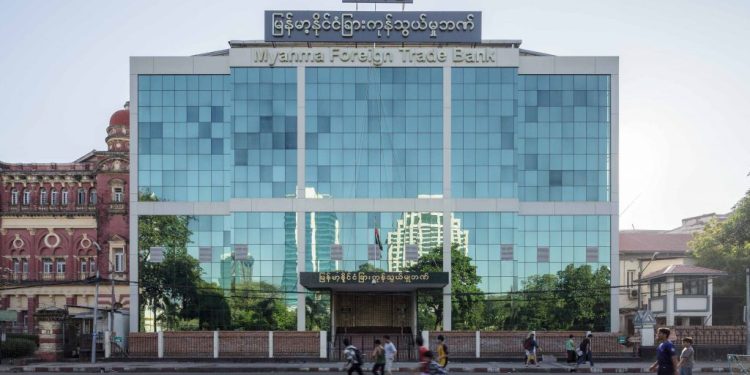The US Treasury has imposed new sanctions on the Myanmar junta’s Ministry of Defense and two regime-controlled banks that facilitate foreign-currency exchange within the country, enabling transactions between the military regime and foreign markets to buy arms and related material.
Myanmar has been in social and political turmoil since the 2021 military coup, and a bloody armed resistance against the regime has been raging across the country for more than two years. To support its efforts to crush the resistance, the regime has relied on foreign sources, including sanctioned Russian entities, to purchase and import arms and related items.
Regarding the sanction on the junta Defense Ministry, the US Department of the Treasury’s Office of Foreign Assets Control (OFAC) said in a statement on Wednesday said that since the coup, the ministry has imported goods and material worth at least US$1 billion, including from Russia.
The two junta-owned banks sanctioned are Myanma Foreign Trade Bank (MFTB) and Myanma Investment and Commercial Bank (MICB), which primarily function as foreign-currency exchanges and enable the conversion of kyats to US dollars and euros, and the reverse.
The banks “primarily function as foreign-currency exchanges” and have allowed Myanmar’s state-owned enterprises access to international markets using offshore accounts, helping them transact more easily with foreign entities, the statement added.
“Burma’s military regime has leveraged state-run access to international markets to import weapons and materiel, including from sanctioned Russian entities, to continue its violence and oppression,” said US Under Secretary of the Treasury for Terrorism and Financial Intelligence Brian E. Nelson, using the country’s former name.
Responding to a news report about possible sanctions published by Thai PBS prior to the US government’s announcement, junta regime spokesperson Major General Zaw Min Tun said on Wednesday that the two banks have no accounts with US-based banks, so the move would not impact the regime financially.
He said people should not be worried about the sanctions, and accused the US of causing unnecessary delays in what he described as the regime’s efforts to establish a multiparty democracy system.
However, following the sanctions news, most money changers in Myanmar suspended dollar transactions, causing the exchange rate to spike to 3,100 kyats to the dollar, from 2,960 kyats. Businesspeople and economic experts in Myanmar feared the kyat-dollar exchange rate would increase more in the coming weeks.
According to the financial and customs laws in Myanmar, all foreign and local businesses must use MFTB or MICB for payments related to local governmental departments. These could include paying the port authority for a shipment, a customs fee in Naypyitaw, or any sort of customs or other payment to a foreign governmental department.
MICB provides the service of opening an LC (letter of credit) for importers, and informs importers about LCs from foreign banks, sending invoices on behalf of exporters, and conducting payments to foreign banks and companies for importers. It also provides services like trade financing and other financial guarantee services for businesses.
MFTB’s foreign-exchange transactions of trade and non-trade volumes are much larger than all the other banks in Myanmar, as it has long worked with other regional and foreign banks. It also assists financial facilities to implement important projects in the infrastructure, agriculture, industrial and telecommunications sectors.

















